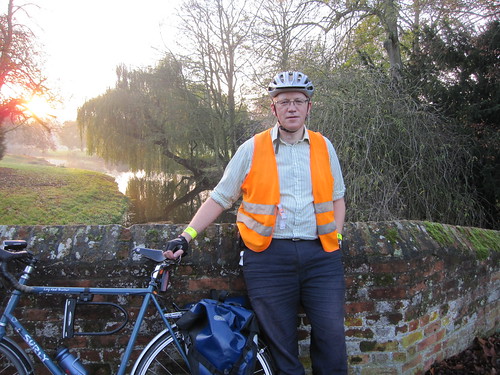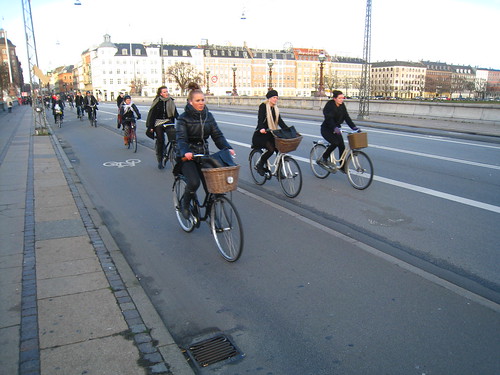For a week of the Invisible Visible Family’s
recently-completed family holiday in France
The swimming gala came back vividly to me when, a few years
ago, a chirpy public relations man suggested that, since I was a keen cyclist,
I should undoubtedly compete in triathlons, as he did. I also recalled how I
had often accompanied my asthmatic and chronically obese classmates in the
trailing group on my school year’s annual cross-country run. The run – which
was sponsored - was perenially used to raise funding for a desperately-needed
new drainage system for the school’s sports fields. Since the event was run
mostly round said sports fields in the midst of a Glasgow
Yet, even for an ill-co-ordinated incompetent such as me,
there remains far too much fun in riding a bike fast to reject the link with
sport altogether. I can, after all, coax my touring bike into managing journeys
in the countryside at an average of around 16mph (26kph) and can get up to
around 50kph in favourable conditions. It’s not, I admit, much compared with
Bradley Wiggins’ 49kph average for the whole Olympic time trial, but it gives
me a sense of achievement. I even, in a moment to counterbalance the snarling
of my school PE teachers, had the satisfaction four years ago of being
complimented on my speed by a fellow cyclist. After I held off his efforts to
overtake me for several miles of our joint commute home, he found me at some
traffic lights and advised I try riding at the local velodrome. “You’ve got a
fair turn of speed,” he said. If I can manage that, it seems sad to tell the
many others with real sporting talent that they should be riding bikes
incapable of a decent pace.
There isn’t, as far as I can see, much link between a
country’s cycling sport success and its people’s propensity to use bikes for
transport. Three of the countries with the most glittering records in the Tour
de France – France, Italy
and Spain – all have lower or
similar proportions of journeys by bicycle than the scarcely cyclist-mobbed United Kingdom
 |
| The chateau at Dampierre sur Boutonne: its townspeople would have cheered the Invisible Visible Man on, except that the race was only in his head. |
But the illusion would quickly break down on the return
journey as I ground my way back up the hill. A baguette would be protruding
from a pannier bag and a load of jus d’orange and pains au raisin would be slowing
me down. I felt again what I truly am – a person who gets about by bike, rather
than a sportsman.
Following this year’s Tour de France and Olympics, there has
been no shortage of opportunities for British cyclists to reflect on the links between
our day-to-day cycling and how Bradley Wiggins rides a time trial or Chris Hoy attacks
a track sprint. We’re engaged in many senses in entirely different activities.
Bradley Wiggins and Chris Hoy shave their legs to achieve maximum aerodynamic
efficiency. I cart around 10 kilos of spare weight just because I won’t lay off
the beer in the evenings. It has nevertheless made me happier than perhaps any
previous sporting result to see Bradley Wiggins – a cyclist intimately familiar
with some of the same London roads that I have ridden so often – control so
comprehensively the Tour de France. I couldn’t quite speak for choking up as I
described to the Invisible Visible Woman how Chris Hoy from Edinburgh
The question is whether my reaction to British cyclists’
victories reflects anything at all in common between what we both do. Is
cycling mainly a sport or just a way of getting about? Should it be mainly a
sport or a way of getting about?
It’s worth stressing quite how miserably humiliating my
efforts to coax my big, lumbering body into sporting activity have generally
proved. I recall, for example, 30 years ago entering the back stroke at a Glasgow
Boys’ Brigade swimming gala. It took my fellow competitors the same time to
complete both lengths of the race as I did for my first. The difficulty in telling
my back stroke from the thrashings of a drowning boy led one of the organisers
to inquire after my wellbeing.
 |
| The Invisible Visible Man at play: does this honestly look to you like a body that should be undertaking triathlons? |
My automatic reaction when asked to participate in a
sporting event is, in fact, to start feeling humiliated. That stems in part
from an incident when a PE teacher taught me and my 12-year-old classmates how
to throw a discus. We then each had a go to see which would go forward to the
school sports day. Ever the optimist, I was convinced I could improve after my
initial, laughable effort and put my hand up when the teacher asked if anyone
wanted a second go. “Don’t waste your own and everyone else’s time,” he replied.
I focused attention on the school choir and public speaking instead.
I should, in other words, be easy prey for the view - which
I’ve seen expressed in the British Cyclists’ Touring Club magazine but which could
equally apply to American cycling - that the focus on sport has been bad for
cycling more widely. Visit a bike shop in Britain Britain –
or America – if the average
bike shop resembled one in the Netherlands
That view has the substantial merit that it explains why
some sights I encounter as a commuter cyclist seem so absurd. Along the Hudson
River Greenway in my new home in New
York New York New York
 |
| The Invisible Visible Man's bike, in France. Sure, Bradley Wiggins, you can win the Tour de France. But could you manage a load of four panniers, a trailer bike and a four-year-old? |
I’m sometimes baffled too by the idea that slow, Dutch-style
bikes are a realistic option in the biggest cities. My new commute to work is
around nine miles each way. Treat that as an opportunity for a slightly faster
form of walking and I’ll be turning round to head home as soon as I arrive –
for the few times I make the trip before they sack me.
 |
| Bikes in Copenhagen: they're sensible, practical - and barely any fun to ride at all |
Nevertheless, I can’t help feeling that British cycling’s sporting
success has to bring at least a small dividend for the country’s commuter
cyclists. A few drivers may, perhaps, briefly regard cyclists not as worrisome
obstacles to get past but future Victoria Pendletons or Laura Trotts whom they
should respect instead of despising. I, like I suspect many other British
cyclists, am holding my head a little higher – or perhaps lower, given the
position’s superior aerodynamics – when cycling. I’m deeply proud to come from
a country with such a powerful cycling sporting position.
It’s not, I suspect, the kind of benefit that many of Britain